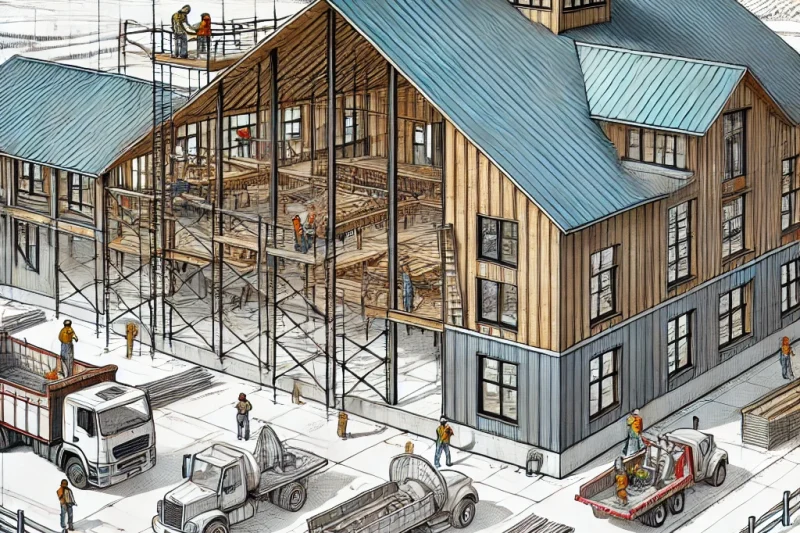Buy in Cambridge, IL with No Money Down!
“Unlock the Power of USDA Mortgages with Smart Mortgage!”
Cambridge, IL USDA Home Loan Guide
What is a Cambridge, IL USDA Mortgage?
Welcome to the Smart Mortgage guide on USDA Mortgages. Navigating the home financing world can be a daunting task, but understanding the various mortgage options available can significantly streamline the process. One such option that you might not be familiar with is the Cambridge, IL USDA mortgage. Let’s dive in.
1. Overview
A USDA mortgage, formally known as the USDA Rural Development Guaranteed Housing Loan, is a mortgage loan offered to rural property owners by the United States Department of Agriculture (USDA). Designed primarily to promote Illinois homeownership in rural and some suburban areas, the Cambridge USDA loan comes with a range of benefits that make it a viable option for eligible homebuyers.
2. Key Features
- No Down Payment: One of the standout features of a USDA loan in Cambridge, IL is the possibility of financing up to 100% of the home’s price. This means eligible borrowers can buy a Illinois home with no down payment.
- Competitive Interest Rates: Typically, USDA loans come with interest rates that are either at or below the market rate.
- Flexible Credit Guidelines: USDA loans often have more lenient credit requirements, which can be beneficial for those with a less than perfect credit history.
Cambridge FL USDA Loan Questions Call (888)416-4805
Get cash from your home.
Apply to see how a cash out refinance can help you.
Homebuyer Seminars
Discover the keys to homeownership at our local home buying seminar – your first step towards securing your dream home!
See our home loans.
Explore our diverse range of home loan programs tailored to fit your unique needs!
3. Eligibility Criteria
To be eligible for a Cambridge, IL USDA mortgage, borrowers must meet certain requirements:
- Location: The Cambridge, IL property must be located in an eligible rural or certain suburban area as defined by the USDA.
- Income Limits: There are specific income requirements, both minimum and maximum, based on the median income of the area.
- Creditworthiness: While the USDA is generally more lenient with credit scores, a certain credit standard must still be met.
- Primary Residence: The borrower must occupy the home as their primary residence.
4. Benefits of a USDA Mortgage
- Affordability: With no down payment and the potential for lower mortgage insurance premiums, a Cambridge, IL USDA loan can be more affordable in the long run.
- Inclusive: It’s a great option for Cambridge, IL first-time homebuyers or those without a substantial savings for a down payment.
- Supporting Rural Development: By opting for a USDA mortgage, you’re indirectly supporting the development and sustainability of rural communities.
5. How Smart Mortgage Can Help
Navigating the intricacies of USDA mortgages can be challenging. That’s where Smart Mortgage steps in. Our team of seasoned USDA mortgage professionals is here to guide you through every step, ensuring you make informed decisions tailored to your needs. Whether you have questions about your eligibility or the application process, we’re here to help.
Take the Next Step Interested in exploring if a Cambridge, IL USDA mortgage is right for you? Get in touch with our Smart Mortgage team today at (888)416-4805. We’re committed to helping you find the best mortgage solution for your unique situation.
Do you need a Pre-Approval?
We are here to help! Get a same day Cambridge, Illinois USDA pre-approval to shop for your dream home!
Mortgage Resource Center

USDA Loans in Illinois: Benefits, Eligibility, and Popular Cities
Buying a home is a significant milestone, and for many, finding the right loan program makes all the difference. If you're considering Read more
Barndominium Financing Made Easy with iLoanUSDA
Barndominium Financing Made Easy with iLoanUSDA: Your One-Time Construction Loan Solution Barndominiums, the stylish and practical combination Read moreMore information About Cambridge, Illinois
Cambridge is a village and the county seat of Henry County, Illinois, United States. The population was 2,160 at the 2010 census, down from 2,180 in 2000.
Before 1843, the land where Cambridge is currently located was the private property of a man named Rev. Ithamar Pillsbury, who was very well known amongst the Yankee settlers (migrants from New England and upstate New York who were descended from the English Puritans who settled New England in the 1600s) who were moving to Henry County in large numbers at that time. Reverend Pillsbury deeded a large portion of his land to the town council and they immediately agreed it was a good place to lay out a town. Lots were sold to incoming migrants and on June 9 of 1843 (after some quarreling among the town founders about how to finance it) construction began on the town. Roads were laid out, post routes established, public buildings erected and people were invited to move there. The original settlers were entirely of New England origins or were Yankees from upstate New York whose families had moved to that place from New England only one generation earlier, in the aftermath of the Revolutionary War. This resulted in Henry County being culturally very contiguous with early New England culture.
According to the 2010 census, Cambridge has a total area of 2.154 square miles (5.58 km2), of which 2.14 square miles (5.54 km2) (or 99.35%) is land and 0.014 square miles (0.04 km2) (or 0.65%) is water.
At the 2000 census there were 2,180 people, 856 households, and 595 families in the village. The population density was 1,540.2 inhabitants per square mile (594.7/km2). There were 896 housing units at an average density of 633.0 per square mile (244.4/km2). The racial makeup of the village was 98.17% White, 0.78% African American, 0.18% Native American, 0.32% Asian, 0.05% Pacific Islander, and 0.50% from two or more races. Hispanic or Latino of any race were 0.46%.
Of the 856 households 31.5% had children under the age of 18 living with them, 57.5% were married couples living together, 8.9% had a female householder with no husband present, and 30.4% were non-families. 26.2% of households were one person and 14.0% were one person aged 65 or older. The average household size was 2.45 and the average family size was 2.95.
We Service the Following Locations in Florida









